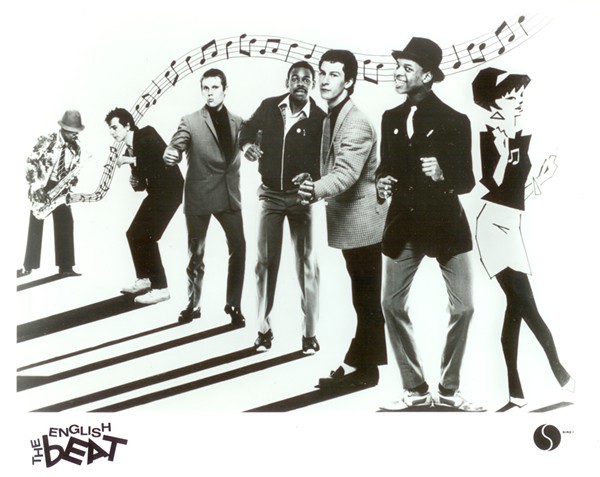English Beat
Chop Shop
April 26, 2013

I can't say this for most bands, but I remember exactly where I was when I first heard the English Beat. Driving through the frozen plains of Nebraska to California in the winter of 1980, I popped a friend's mixtape into the cassette player. Among the melange of '70s paleo-hipster shit like Gong and Amon Duul, and the monochromatic punk rock roar of the Sex Pistols and the Saints, the English Beat's "Mirror in the Bathroom" immediately stood out - sharp, shiny and soul-stirring. The song's infectious rhythms and snarky put-down of nihilism was refreshing amid the first flush of punk, and it was unlike anything I had ever heard before. I realized later that the Beat's two-tone revivalism was so new to me because I was unfamiliar with their roots, but the band became the perfect gateway to ska, blue-beat and rock steady.
Clutching this nugget of nostalgia, I expected the Beat's Chop Shop gig on Friday, April 26, to be a well-oiled oldies revue for aging 80s punters. Someone forgot to run this agenda past the band - and the audience. The crowd only slightly favored graying stalwarts who were around during the heyday of US Festivals. Almost half of the capacity crowd were a mix of tweens tagging along with parents and 20-somethings who immediately formed the ranking- skanking dance circles I recalled from those days of yore.
Nowadays, The English Beat is founder-singer-guitarist Dave Wakeling and a crew of inspired young guns. (Wakeling's former co-frontman Ranking Roger tours a British-based version of the two-tone titans dubbed The Beat. Perhaps the universe will implode if these two English Beat revival troupes ever meet, but so far the ska multiverse remains intact.) My expectations of a professional by-the-numbers run-through of the Beat's iconic canon was only partially confirmed. True, Wakeling and cohorts were slick, professional and tight, but they were also adventurous improvisors, displaying the intuitive swing of a crew that has played together for some time.
Breaking a sweat by the second number, Wakeling delivered snarky one-liners, puns and a faux Latin liturgical incantation to introduce the soulful jazz pop gem "I Confess." Yet, his patter was delivered with enthusiasm and sincerity. Like a good stand-up comic, he kept shtick that he must have trotted-out countless times before heartfelt and fresh.
Live, the Beat's back catalog benefited from a beefed-up backbeat and adrenalized tempos. Playing with precision and passion, the line-up of drums, bass, keys and sax interacted telepathically with Wakeling and toaster-hype man (and former Charlotte resident) Antoine First Class. "Click Click" in particular was a revelation. The energized ska rave-up of the original was turned into an inspired avant-garde noise work-out, building off skronking sax and the No Wave drone of Wakeling's guitar to a free jazz crescendo.
The dance floor was packed at the get-go and only a few die-hards clung to their VIP seats in glorified bleachers. The audience's response was certainly due to the band's energy and infectious good cheer, but it was also a reaction to the durability of the songs. The English Beat's legacy scores with modern ears in a way that outstrips the appeal of late '70s two-tone peers like Madness and The Specials. The Beat never had a a chart monster like Madness' "Our House," so they didn't fall prey to the pop treadmill. While they never hit the heights of The Specials' impressive "Ghost Town," the Beat were better at diversification, moving rapidly from ska-and-punk purism into jazz, soul and afrobeat.
In interviews, Wakeling has noted that the Beat's endurance may due to the timelessness of their material. Instead of trendy and soon-to be-dated '80s synthesizers, The English Beat kept it to traditional bass, guitar, drums, keys and sax. It's no accident that the core band sounds less cheezily '80s than later offshoots like General Public and Fine Young Cannibals.
Whatever the reason for the English Beat's staying power, it was certainly displayed on the Chop Shop's dance floor. A middle-aged man ranking full stop beside me didn't miss a step when he said, "You can't keep still when the English Beat start playing." The years dropped away from two women at the front of the stage as they starting leaping up and down like teenagers.
Maybe that's what the Chop Shop's listing meant by "all ages show": 57-year-old Dave Wakeling and his band worked a rare alchemical magic on the audience, making everyone ageless.
